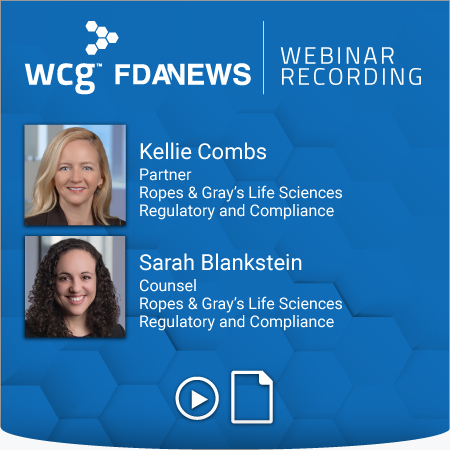Product Details
You want to benefit from the FDA’s incentives for its pharmaceutical expedited pathways but the assortment of possibilities is dizzying.
Priority Review … Accelerated Approval … Fast Track … Breakthrough Therapy … Regenerative Medicine Advanced Therapy (RMAT) … Limited Population Pathway for Antibacterial and Antifungal Drugs (LPAD) …
Each has its own eligibility criteria and benefits and each is meant to be pursued at different points in the product-development timeline.
How can you untangle the differences between the various programs and figure out whether your product candidate is eligible and how to apply?
Two lawyers in Ropes & Gray’s Life Sciences Regulatory and Compliance practice will explain it all, so you can reap the benefits.
Kellie Combs, partner and co-chair of the firm’s cross-practice Digital Health Initiative, and Sarah Blankstein, counsel, will share what you must know about qualifying criteria, what data or other information the FDA may expect, when to initiate discussions with the agency and best practices for securing the benefits.
Presentation Takeaways:
- The meaning of key terms, including “serious condition,” “available therapies” and “unmet medical need”
- Eligibility criteria, including data-generation requirements
- Timing and content considerations for designation requests and applications for expedited approval programs
- How to qualify for multiple programs
- Other considerations, including inspections, FDA engagement and manufacturing scale-up
- What you must know about the three relevant FDA guidances: Guidance on Expedited Programs for Serious Conditions — Drugs and Biologics (2014), Guidance on Expedited Programs for Regenerative Medicine Therapies for serious Conditions (2019) and Guidance on Limited Population Pathway for Antibacterial and Antifungal Drugs (2020)
The various expedited pathway benefits — earlier and more frequent FDA interactions, streamlined clinical development requirements, a shorter FDA review clock — can accelerate time to market. And it all starts with this presentation.
Meet Your Presenters
Kellie Combs is a partner in Ropes & Gray’s Life Sciences Regulatory and Compliance practice, based in Washington, DC. She is also a co-chair of the firm’s cross-practice Digital Health Initiative. Ms. Combs provides legal and strategic advice to pharmaceutical, biotechnology, medical device, food and cosmetic manufacturers, as well as hospitals and academic institutions, on a broad range of issues under the Food, Drug, and Cosmetic Act and the Public Health Service Act. She has extensive experience handling matters related to FDA promotional rules and the First Amendment and also routinely advises clients on lifecycle management, regulation of clinical research and postapproval compliance.
Sarah Blankstein is counsel in Ropes & Gray’s Life Sciences Regulatory and Compliance practice, based in Boston. She provides legal and strategic advice to companies on a wide array of FDA regulatory matters, with a focus on promotional and postmarket compliance matters, lifecycle management, digital health and product development. Ms. Blankstein also regularly provides regulatory counsel for transactions as well as complex internal investigations and government enforcement matters involving issues related to the Food, Drug, and Cosmetic Act.
Who Will Benefit
- Regulatory affairs professionals
- Research and development personnel
- Legal counsel
